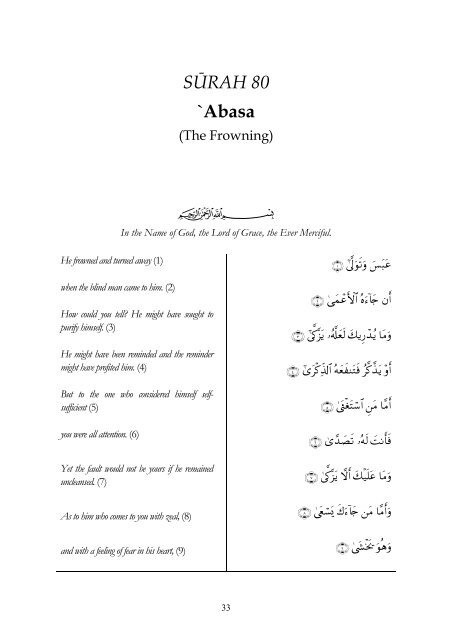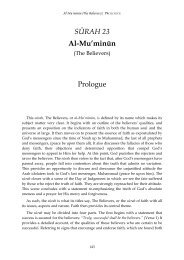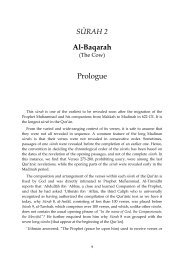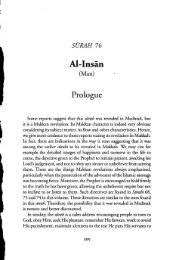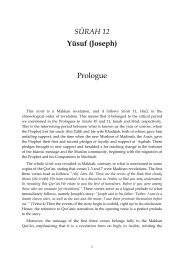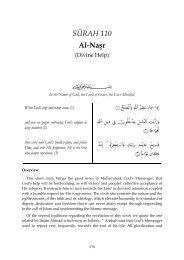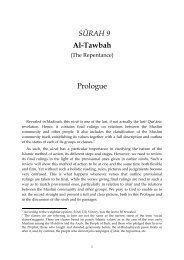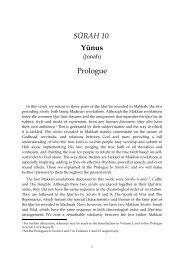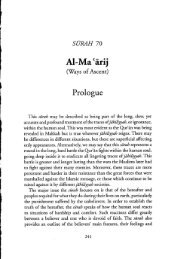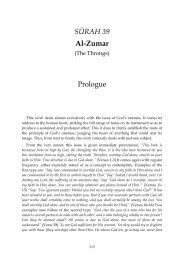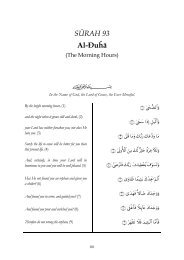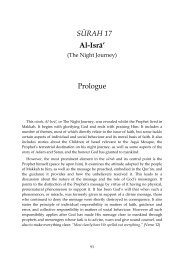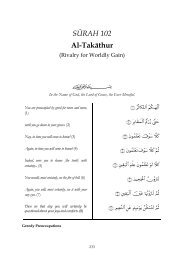SŪRAH 80 `Abasa - TAFSIR FI ZILAL AL-QURAN
SŪRAH 80 `Abasa - TAFSIR FI ZILAL AL-QURAN
SŪRAH 80 `Abasa - TAFSIR FI ZILAL AL-QURAN
You also want an ePaper? Increase the reach of your titles
YUMPU automatically turns print PDFs into web optimized ePapers that Google loves.
SŪRAH <strong>80</strong><strong>`Abasa</strong>(The Frowning)ijkIn the Name of God, the Lord of Grace, the Ever Merciful.He frowned and turned away (1)when the blind man came to him. (2)How could you tell? He might have sought topurify himself. (3)He might have been reminded and the remindermight have profited him. (4)But to the one who considered himself selfsufficient(5)you were all attention. (6)Yet the fault would not be yours if he remaineduncleansed. (7)∩⊇∪ #’¯
Let man reflect on the food he eats: (24)∩⊄⊆∪ ÿ⎯ÏμÏΒ$yèsÛ 4’n
Some faces on that day shall be beaming, (38)smiling and joyful. (39)Some other faces on that day shall be covered withdust, (40)veiled with darkness. (41)These shall be the faces of the unbelievers, thehardened in sin. (42)∩⊂∇∪ ×οtÏó¡•Β 7‹Í×tΒöθtƒ ×νθã_ãρ∩⊂®∪ ×οuųö6tFó¡•Β ×πs3Ïm$|Ê∩⊆⊃∪ ×οuy9xî $pκön=tæ >‹Í×tΒöθtƒ ×νθã_ãρuρ∩⊆⊇∪ îοutIs% $yγà)yδös?∩⊆⊄∪ äοtyfxø9$# äοtxs3ø9$# æΛèε y7Íׯ≈s9'ρé&OverviewThis sūrah discusses certain principles of grave importance. It is unique in itsimages and the impressions it leaves. Furthermore, it combines its marked spiritualeffect with superb musical rhythm.Its first part treats a certain incident which took place in the early days of Islam.The Prophet (peace be upon him) was busy with a few Quraysh dignitaries,explaining to them the Islamic message, when Ibn Umm Maktūm, a poor blind man,interrupted him. Unaware that the Prophet was busy, the blind man asked himrepeatedly to teach him some verses from the Qur’ān. The Prophet (peace be uponhim) was not very pleased at this interruption. He frowned and turned away fromIbn Umm Maktūm. This sūrah opens by criticizing the Prophet’s behaviour in thisincident. It lays down clearly the values and principles upon which Islamic society isfounded and states the true nature of the message of Islam. “He frowned and turnedaway when the blind man came to him. How could you tell? He might have sought to purifyhimself. He might have been reminded and the reminder might have profited him. But to theone who considered himself self-sufficient you were all attention. Yet the fault would not beyours if he remained uncleansed. As to him who comes to you with zeal, and with a feeling offear in his heart, him you ignore. No indeed! This is an admonition. Let him who will, bear itin mind. It is written on honoured pages, exalted, purified, by the hands of noble and devoutscribes.” (Verses 1-16)Man’s ungrateful attitude towards God and his denial of Him come up fordiscussion in the second part. Here man is reminded of his origin; how his life ismade easy; how God determines his death and resurrection; and how, after all this,he fails to carry out His orders: “Perish man! How ungrateful he is! Of what did God36
<strong>`Abasa</strong> (The Frowning)create him? Of a drop of sperm. He created him and proportioned him. He makes his pathsmooth for him. He then causes him to die and puts him in his grave. He will surely bringhim to life when He pleases. But by no means has man fulfilled His bidding.” (Verses 17-23)The third part directs man to reflect upon things of immediate concern to him,namely, his food. Absolute perfection of creation is obvious in the provision of foodfor man as it is obvious in the creation, proportioning and development of manhimself: “Let man reflect on the food he eats: how We pour down the rain in torrents, andcleave the earth in fissures; how We bring forth the corn, the grapes, and the fresh vegetation,the olive and the palm, the dense- treed gardens, the fruit-trees and the green pastures, for youand your cattle to delight in.” (Verses 24-32)The final part touches upon “the stunning blast” and its fearful effects. The verysound of the words gives the impression of horror. It makes people unaware ofanything around them. Their faces, however, provide a lucid account of what ishappening to them. “But when the stunning blast is sounded, on that day everyone willforsake his brother, his mother and his father, his wife and his children: for each one of themwill on that day have enough preoccupations of his own. Some faces on that day shall bebeaming, smiling and joyful. Some other faces on that day shall be covered with dust, veiledwith darkness. These shall be the faces of the unbelievers, the hardened in sin.” (Verses 33-42)A quick preview of the sūrah leaves a profound effect on the reader. Its messageand its implications are so powerful that no human heart can avoid being deeplytouched, even by a quick perusal of it. In the following pages we will attempt toillustrate some of the far-reaching effects certain parts of the sūrah have and whichmay not be immediately apparent.The Basis of Social ValuesHe frowned and turned away when the blind man came to him. How could you tell?He might have sought to purify himself. He might have been reminded and thereminder might have profited him. But to the one who considered himself selfsufficientyou were all attention. Yet the fault would not be yours if he remaineduncleansed. As to him who comes to you with zeal and with a feeling of fear in hisheart, him you ignore. No indeed! This is an admonition. Let him who will, bear it inmind. It is written on honoured pages, exalted, purified, by the hands of noble anddevout scribes. (Verses 1-16)The divine instructions which followed this incident are much more far reachingthan appears at first sight. They are indeed a miracle. These instructions, theprinciples they seek to establish and the change they aim to accomplish in human37
<strong>`Abasa</strong> (The Frowning)society are, perhaps, the most important miracle of Islam. But the instructions aremade here as a direct comment on a single incident. It is part of the Qur’ānic methodto make use of isolated incidents in order to lay down fundamental and permanentprinciples. The principles established here and their practical effects, as seen in theearly Islamic society, are indeed the essence of Islam. They constitute the truth whichIslam, and all divine religions that preceded it, seek to plant in human life.The point at issue here is not merely how an individual or a class of people shouldbe treated. This is indeed the significance of the Qur’ānic comment on the incidentitself, taken in isolation. The heart of the matter is, however, something far moreimportant. It is: how should people evaluate everything in their lives? From whereshould they derive the values and standards necessary for such an evaluation?What the divine instructions contained in the opening part of the sūrah seek toestablish is that people must base their values and standards on divineconsiderations, laid down by God. No social circumstances, traditions or practices,nor any concept of life derived from them should be allowed either to encumber ordetermine these values and standards. There is no denying the difficulties involvedin conducting human life on the basis of values and standards laid down by theDivine Being, free from the pressure of all worldly considerations.If we consider the pressure of society on the individual’s feelings and attitudes,and the weight of considerations to be taken into account such as traditional values,family and social ties, as well as the values that prevail in one’s own environment,we can appreciate the difficulty of carrying out these divine instructions. Ourappreciation of such difficulty is even greater when we remember that in order toconvey it to people, Muĥammad himself (peace be upon him) needed this specialdirective, or rather censure. Reference to this is sufficient to convey the gravity of thematter. For Muĥammad (peace be upon him) attained greater heights of sublimityand greatness than any man can aspire to. Yet the fact that special instructions wererequired for him to convey a certain principle makes that principle greater thangreatness, subliminally unique.This is, indeed, a true description of the principle established here, namely thatmankind should derive their values and standards from the Divine Being, after theyhave freed themselves from the pressure of their social set-up with all its values andstandards.The basic standard God has, through His prophets, commanded mankind to adoptis: “The noblest of you in God’s sight is he who fears Him most.” (49: 13) This is thestandard by which all values, traditions and practices should be evaluated. Itestablishes a purely divine criterion which has nothing to do with any worldlyconsiderations. But people live on earth and establish a multitude of ties, each having38
<strong>`Abasa</strong> (The Frowning)its own weight and gravity. They have considerations of family relations, power andwealth. The distribution or concentration of these creates certain practical andeconomic results which determine the position of every man, woman or class ofpeople in relation to others. Thus some acquire a position superior to that of others,in worldly standards.When Islam declares, “The noblest of you in God’s sight is he who fears Him most,” itsimply indicates that all these values and considerations are void, howeverimportant they seem to us. It substitutes for them a single value derived directlyfrom God. Moreover, it is the only value acceptable to Him. The incident depictedhere serves to establish this value in an actual situation. Thus the essential principleis established: the scales recognized are those of God; the supreme value whichshould govern human life is the divine one. Hence, the Muslim community mustabandon all human values, standards, traditions and concepts.Who Takes Priority?Let us now consider the incident itself. Ibn Umm Maktūm, a poor blind man,comes to the Prophet (peace be upon him) at a time when he is busy with a group ofthe most powerful and influential personalities in Makkah, including ‘Utbah andShaybah, sons of Rabī`ah, Abū Jahl, `Amr ibn Hishām, Umayyah ibn Khalaf, al-Walīd ibn al-Mughīrah. Also present is al-`Abbās ibn `Abd al-Muţţalib, the Prophet’suncle. It is a crucial meeting. The Prophet explains the message of Islam to them andhopes for a favourable response. He feels that the cause of Islam stands to gain muchby such a response. Islam is facing a hard time in Makkah. Those very people havebeen using all their wealth, power and influence to check its advancement, and stoppeople from accepting it. They have managed to freeze Islam in Makkah and hinderits progress elsewhere. Outside Makkah, the other tribes have adopted an attitude ofwait and see. For they feel this to be their best stand in a society which givesparamount importance to the tribe’s attitude. They are aware that againstMuĥammad, the Prophet of Islam, stand his own kinsmen, who, theoreticallyspeaking, should be his most ardent supporters.It must be emphasized that when we say that the Prophet is busy with thesepeople, he has no personal interest in them. He is simply working for Islam.Acceptance of Islam by these influential and powerful people means the removal ofall impediments from the path of Islam in Makkah. It also ensures for Islam thefreedom to progress in the rest of Arabia.While this crucial meeting is in progress, a poor man comes and interrupts theProphet (peace be upon him) saying: ‘Messenger of God! Teach me some verses ofwhat God has taught you.’ Although he could sense that the Prophet is busy, he39
<strong>`Abasa</strong> (The Frowning)repeats his request several times. The Prophet dislikes this interruption. His face,which remains unseen by the blind man, expresses his aversion. He frowns and looksaway from the poor man. Indeed, the Prophet’s motive has been his great enthusiasmto win badly needed support for Islam.Here, heaven intervenes to say the final word in this matter and to put landmarksalong the whole length of the road the Islamic message should take. Thus we aregiven the scales by which to weigh our values regardless of all other considerations,including those which may appear to serve the interests of Islam, as seen by humanbeings, including Muĥammad, the greatest of all mankind. This is why the Prophetwho has been described elsewhere in the Qur’ān as having “great and sublime nature”,(68: 4) is strongly censured by God, the Most High. It is the only point in the Qur’ānwhere the Prophet, who is very dear to God, is addressed by the term kallā,[inadequately translated as “no indeed”]. Kallā is a term of censure and an order todesist. This is because the contravened principle is central to this religion.The reproof is made in a unique style, which defies translation into ordinarylanguage. Written language has to apply certain rules and observe some well definednorms. These would dampen the effects of the very vivid style which is characterizedin this instance by its rapid touches and short phrases which are more like reflexactions and instant pictures.“He frowned and turned away when the blind man came to him.” (Verses 1-2) The use ofthe third person here is significant. It suggests that the subject matter is so distastefulto God that He does not like to confront His beloved Messenger with it. This in itselfis a gesture of mercy and kindness to the Prophet. Thus, the action whichnecessitated the reproof has been disguised with great subtlety. The reproof thentakes the form of direct address, starting somewhat mildly: “How could you tell? Hemight have sought to purify himself. He might have been reminded and the reminder mighthave profited him.” (Verses 3-4) How could you tell but that a great gain might havebeen made? That is to say that the poor, blind man who came to you seeking lightmight have profited by God’s reminder and set about purifying himself. His heartmight have been brightened by God’s light and he might have become like alighthouse, guiding people to safety. This is exactly what happens every time ahuman being genuinely accepts the faith. It is, indeed, what carries real weight onGod’s scales.The reproof then takes a stronger tone. It wonders at the action in question: “But tothe one who considered himself self-sufficient you were all attention. Yet the fault would notbe yours if he remained uncleansed. As to him who comes to you with zeal and with a feelingof fear in his heart, him you ignore.” (Verses 5-10) The one who pretends that he can dowithout you and your religion, light, goodness and purity is the one who receivesyour attention! You go to him yourself when he turns away, and you are at pains to40
<strong>`Abasa</strong> (The Frowning)early Muslims, from both the Muhājirīn (Makkans) and the Anşār (Madinans),including his two most distinguished Companions and immediate successors, AbūBakr and `Umar, as well as his own relative Sa ‘d ibn Abī Waqqāş, one of the veryearliest people to embrace Islam, were in that army. Some people, however,grumbled about the fact that Usāmah had been made commander, young as he was.`Abdullāh ibn `Umar takes up the story: “When some people complained aboutgiving the army command to Usāmah, the Prophet said: ‘You are deprecating hisappointment as commander in the same way as you previously deprecated hisfather’s appointment. By God, his father was a worthy commander, and one of thedearest people to me. Usāmah is also one of the dearest people to me.” [Related byal-Bukhārī, Muslim and al-Tirmidhī.]Some people spoke in derogatory terms about the Prophet’s Companion, Salmān,the Persian. They took a narrow nationalistic view and spoke of the inferiority of thePersians in relation to the Arabs. The Prophet took a decisive step to eradicate suchnarrow tendencies. He declared: “Salmān belongs to the Prophet’s family.” [Relatedby al-Ţabarānī and al-Ĥākim.] This statement transcends all lineage, tribal andnational considerations, which carried immense weight in Arabia.Furthermore a disagreement occurred between Abū Dharr and Bilāl, two of theProphet’s highly esteemed Companions. In a fit of temper, Abū Dharr called Bilāl“the son of a black woman”. The Prophet was extremely upset at this. He rebukedAbū Dharr saying: “That is too much, Abū Dharr. He who has a white mother has noadvantage which makes him better than the son of a black mother.” [Related by Ibnal-Mubārak with slightly different wording.] Thus the Prophet put the dispute intoits proper perspective. What distinguishes people is their faith, not their colour. Thisis the Islamic criterion, which is so unlike the worldly criteria of jāhiliyyah societies.The Prophet’s rebuke had a profound effect on Abū Dharr, who was very sensitive.He wanted to atone for his mistake, so he put his head on the ground swearing thathe would not raise it until Bilāl had put his foot over it.Bilāl achieved a position of great distinction in Islamic society. What made hisachievement possible was the application of heaven’s values. Abū Hurayrah relatedthat the Prophet once said to Bilāl: “Tell me, which of your actions do you hope to bethe most rewarding for you, for last night I heard your footsteps as you drew near tome in heaven?” Bill answered: “I do not think that since becoming a Muslim I haveever done anything which I hope to be more rewarding than that every time Iperform ablution at any time of the day or night I pray whatever I can.” [Related byal-Bukhārī and Muslim.]Once `Ammār ibn Yāsir asked for permission to see the Prophet. The Prophet said:“Let him come in. Welcome to the cleansed, good man.” [Related by al-Tirmidhī.] Healso said of him: “Ammār is full of faith to the top of his head.” [Related by al-44
<strong>`Abasa</strong> (The Frowning)Nasā’ī.] Ĥudhayfah related that the Prophet said: “I do not know how long I shall bewith you, so accept the leadership of the two who will follow me [and he pointed toAbū Bakr and `Umar], and follow `Ammār’s guidance. Believe whatever Ibn Mas`ūdtells you.” [Related by al-Tirmidhī.]Ibn Mas`ūd was so close to the Prophet that any stranger in Madinah would havethought him a member of the Prophet’s household. Abū Mūsā said: “I came toMadinah from the Yemen with my brother. For quite some time we were under theimpression that Ibn Mas`ūd and his mother belonged to the Prophet’s household, animpression we had formed because of the frequency of their comings and goingsfrom the Prophet’s homes, and their long companionship with him.” [Related by al-Bukhārī and Muslim and al-Tirmidhī.]The Prophet himself sought the hand of an Anşārī woman in marriage for Julaybib,a former slave. “Her parents were reluctant to sanction such a marriage. She,however, said to them: ‘Do you mean to reject the Prophet’s suit? If the Prophetthinks that this man is suitable for us, then let this marriage go through.’ So theygave their consent.” [Related by Aĥmad.]Soon after his marriage, Julaybib took part in an armed expedition. After thebattle, which resulted in a victory for the Muslims, the Prophet asked hisCompanions: “Is anybody missing?” They named a few people. He repeated thequestion and they named a few others. He asked the same question for the third timeand they answered in the negative. He said: “I think Julaybib is missing.” Theylooked for him and found his body next to seven enemy soldiers whom he hadkilled. The Prophet went over, stood near him, and said: “He killed seven before hehimself was slain. This man belongs to me and I belong to him.” He lifted him intohis arms until a grave had been dug. He then put him in his grave. The tradition doesnot say whether Julaybib was given a death wash or not. [Related by Muslim.]The Principle in PracticeWith this divine instruction and the Prophet’s guidance, the rebirth of humanitywas accomplished in a unique manner. Thus a new society came into existence,which imported its values and standards from heaven, and lived on earth,unhampered by earthly restrictions. This is the greatest miracle of Islam; a miraclewhich could not have happened except by God’s will, and through the Prophet’sactions. This miracle is, in itself, proof that Islam is a religion revealed by God, andthat the man who conveyed it to us was His Messenger.It was divine will that leadership of the Islamic society, after the Prophet’s death,should be assigned successively to Abū Bakr and `Umar, the two who were mostkeenly aware of the true nature of Islam and most vividly impressed by the Prophet’s45
<strong>`Abasa</strong> (The Frowning)guidance. Indeed, Abū Bakr and `Umar surpassed everyone else in their love for theProphet and determination to follow very closely in his footsteps.Abū Bakr was well aware of the Prophet’s object in assigning the army’scommand to Usāmah. His first action after he became Caliph was to send the armyraised by the Prophet and commanded by Usāmah on its original mission. Abū Bakr,the Caliph, went along with the army to the outskirts of Madinah to bid it farewell. Itwas a strange scene: ‘Usāmah on his horse while Abū Bakr walked. Usāmah, theyoung commander, felt embarrassed that he should ride while the Caliph, an oldman, should walk. He begged Abū Bakr to ride, or else he would walk alongsidehim. Abū Bakr refused, saying: “You shall not walk and I shall not ride. It will do meno harm to walk for an hour if my walking is for God’s cause.”Abū Bakr felt that he needed `Umar to help him shoulder the responsibilities ofgovernment. `Umar, however, was a soldier in Usāmah’s army, so he had to askUsāmah’s permission to discharge him. Hence, the Caliph, the Head of State, said tohis army commander: “If you think you can spare `Umar to help me, then please doso!” What a request! It is the height of magnanimity, attainable only with God’s will,by individuals well taught by God’s Messenger.A few years later `Umar assumed the leadership of the Muslim community, as itssecond Caliph. One of his actions was to appoint Ammār ibn Yāsir, who formerlybelonged to the lower classes of Makkah, as governor of the Kufah region in Iraq.One day a number of dignitaries from the Quraysh, including Şuhayl ibn `Amrand Abū Sufyān, sought to see `Umar. He let them wait and admitted first Şuhayband Bilāl, two former slaves, on the grounds of their early acceptance of Islam andtheir taking part at the Battle of Badr. Abū Sufyān was angry and said: “I have neverseen a day like this. These slaves are admitted and we are kept waiting!” Şuhayl,who was more keenly aware of the true nature of Islam, said: “Gentlemen! I see inyour faces an expression of what you feel, but I say to you that if you are angry youshould be angry with yourselves. Both they and you were called upon to acceptIslam at the same time. They were quick to respond but you were slow. What willyou do if on the Day of Judgement you find that they are included among the chosenand you are left behind?”`Umar allotted Usāmah ibn Zayd a larger share of the spoils of war than heallotted his own son Abdullāh. When `Abdullāh queried his father’s decision `Umarsaid: “Son, the Prophet used to love Zayd more than he loved your father, and heloved Usāmah more than he loved you. What I did was simply to attach to theProphet’s love higher value than I attached to my own love.” As he said this `Umarwas, of course, fully aware that the Prophet measured his love by divine standards.46
<strong>`Abasa</strong> (The Frowning)`Umar sent Ammār to question Khālid ibn al-Walīd, the victorious commander ofthe Muslim army who belonged to a noble family, about certain charges. `Ammārtied Khālid’s robes round his neck. Some reports add that he tied Khālid’s handsthroughout the interrogation with his own turban. When the investigation provedKhālid’s innocence, `Ammār untied him and put Khālid’s turban back on his headwith his own hands. Khālid did not object to this treatment. He knew that `Ammārwas one of the Prophet’s early Companions. Khālid also knew what the Prophet usedto say about `Ammār, which we have already quoted.It was `Umar himself who used to say about Abū Bakr and Bilāl: “Abū Bakr is ourmaster and he freed our master.” This refers to the days when Bilāl was Umayyahibn Khalaf’s slave, who tortured him mercilessly in order to turn him away fromIslam. Abū Bakr bought Bilāl from Umayyah and set him free. This former slave,Bilāl, is described by `Umar, the Caliph, as “our master”.`Umar was the one who said, “Had Sālim, the former slave of Abū Ĥudhayfah,been alive I would have nominated him to succeed me.” This statement must betaken against the background that `Umar did not nominate anyone to succeed him,not even `Uthmān, `Alī, Ţalhah or al-Zubayr. He only appointed a consultativecommittee of six, so that the next Caliph should be chosen from among them.`Alī ibn Abī Ţālib sent `Ammār and al-Ĥasan, his own son, to Kūfah to seek itspeople’s support against `Ā’ishah [may God be pleased with her]. His message said,“I know that she is your Prophet’s wife in this life and in the life to come. You are,however, faced with a test which will prove whether you follow your Prophet or hiswife.” [Related by al-Bukhārī.] The people of Kūfah accepted his case against`Ā’ishah, mother of the believers and Abū Bakr’s daughter, [may God be pleasedwith them all].Bilāl was asked by his brother in Islam, Abū Ruwayĥah of Khatham, to speak onhis behalf to the family of a Yemeni woman he wished to marry. Bilāl did so, saying:“I am Bilāl ibn Rabāĥ and this is my brother, Abū Ruwayĥah. He lacks goodmanners and firm belief. You may please yourselves whether you give him yourdaughter in marriage or not.” He did not deceive them by hiding the truth, nor didhe behave as a mediator, unmindful of his accountability to God. The familyconcerned were pleased with such honesty. They married their daughter to AbūRuwayĥah, the noble Arab whose advocate was Bilāl, a former slave from Abyssinia.This fundamental principle remained firmly entrenched throughout Islamicsociety for centuries, despite the various factors working for a setback. `Abdullāh ibn`Abbās was always remembered with his slave `Ikrimah, while `Abdullāh ibn `Umarwas remembered with his slave Nāfi`. Anas ibn Mālik was always associated withhis slave Ibn Sīrīn, as was Abū Hurayrah with his slave `Abd al-Raĥmān ibn47
<strong>`Abasa</strong> (The Frowning)Hurmuz. 2 In the generation that followed, the most distinguished men of learningwere al-Ĥasan in Başrah, Mujāhid ibn Jabr, `Aţā’ ibn Rabāĥ and Ţāwūs ibn Kaysān.In Egypt, Yazīd ibn Abī Ĥabīb, a black slave from Dengla, was the grand Mufti[holder of the highest position of religious authority] during the reign of `Umar ibn`Abd al-`Azīz. 3This divine standard continued to win great respect for the pious and God-fearing,even when they were deprived of all things to which worldly considerationsattached great value. It is only in comparatively recent times that this divinestandard has ceased to operate. For now the whole world is overwhelmed by a tideof jāhiliyyah, wherein there is a total disregard for divine values. In the United States,the leading Western country, a man is valued according to the size of his bankbalance. In the Soviet Union, 4 where Communism, the ruling philosophy, looks at lifeas no more than matter, and a man is worth less than a machine. The land of Islam,on the other hand, has sunk back into jāhiliyyah. The creeds of jāhiliyyah, which Islamhad rooted out, have now been revived. The divine standard has been abandoned infavour of materialistic values which are completely alien to Islam.The only hope that remains is that the Islamic revivalist movement will rescuemankind once again from the clutches of jāhiliyyah and bring about humanity’ssecond rebirth, similar to the one announced by the decisive verses at the opening ofthis sūrah.Man’s Arrogant AttitudeThe second part of the sūrah wonders at man’s conceit as he turns his back on thetrue faith. It wonders at how man forgets his humble origins, and how he remainstotally oblivious of the care God has taken of him and His complete power overevery stage of his existence, both in this life and in the hereafter. In his ingratitudeman fulfils nothing of his duties towards his Lord, who has created and sustainedhim and who will hold him to account for his actions: “Perish man! How ungrateful heis! Of what did God create him? Of a drop of sperm. He created him and proportioned him.He makes his path smooth for him. He then causes him to die and puts him in his grave. Hewill surely bring him back to life when He pleases. But by no means has man fulfilled Hisbidding.” (Verses 17-23)“Perish man!” He deserves to die. The mode of expression employed also adds to2 All these were scholars of the highest calibre, with the four mentioned first being Companions of theProphet. The others passed on their scholarship to the succeeding generations. — Editor’s note.3 These details are based on information given by A.H. al-Guindi in his book Abū Ĥanīfah, Cairo.4 The author is referring here to the former Soviet Union, which was one of the two superpowers in hisown time. — Editor’s note.48
<strong>`Abasa</strong> (The Frowning)the sense of horror excited by this abominable attitude. “How ungrateful he is!” Hestrongly denies the claims of his creation. Had he been mindful of these claims hewould have been humbly grateful to his Lord who created him. He would not haveshown such conceit and he would have remembered the end he is certain to meet.Indeed, how can man be so arrogant and conceited? What are his origins: “Of whatdid God create him?” (Verse 18) His is a very humble origin, worthless indeed exceptfor God’s grace. “Of a drop of sperm. He created him and proportioned him.” (Verse 19) Adrop of sperm of no significance; that is man’s beginning. God, the Creator, thenproportioned him. The Arabic verb used here qaddara denotes precise and meticulousproportioning. It also denotes bestowing weight and value. This is how man hasbeen created, honoured and raised from his humble origins to a high position inwhich the whole world has been put at his disposal.“He makes his path smooth for him.” (Verse 20) The path of life has been smoothedfor him. He has also been given the ability to recognize and follow the right path.When the journey of life is over, when every living being meets its inevitable end,“He then causes him to die and puts him in his grave.” (Verse 21) So in the end the case isjust the same as in the beginning: man submits to his Lord who brings him to lifewhen He wills and ends his life when He wills. He honours him by making the earthhis last abode, rather than leaving him as food for wild animals. He has made it partof human nature to bury the dead. When the time He has appointed arrives, Hebrings him back to life for the reckoning: “He will surely bring him back to life when Hepleases.” (Verse 22) So man will not be left without reward or retribution.But has man prepared himself for this reckoning? It would seem that “by no meanshas man fulfilled His bidding.” (Verse 23) Mankind as a whole, from the very first to thevery last, will not have fulfilled God’s bidding. This is the inference of the Arabicexpression used here, lammā Yaqđi mā amarah. Man will always remain negligent ofhis duties. He will never remember his origins and creation as he should, nor will hethank and praise his Creator who has guided and looked after him as He should bethanked and praised. Man does not prepare himself in this life for the day of rewardand retribution. This applies to humanity as a whole. In addition, the great majorityof people arrogantly turn their backs on divine guidance.Useful ReflectionNext, the sūrah invites man to reflect upon his food and that of his cattle, which isone of the great many things God has provided for him: “Let man reflect on the food heeats: how We pour down the rain in torrents, and cleave the earth in fissures; how We bringforth the corn, the grapes, and the fresh vegetation, the olive and the palm, the dense-treedgardens, the fruit trees and the green pastures, for you and your cattle to delight in.” (Verses49
<strong>`Abasa</strong> (The Frowning)24-32)This is the full story of man’s food, related here stage by stage. Let man reflect:does he play any significant role in it? Can he determine or change its course?Indeed, the same hand which has brought him to life has brought forth the foodwhich sustains him.“Let man reflect on the food he eats.” (Verse 24) Food, the first necessity of human life,deserves a few thoughts. It is made readily available day after day. But behind allthis is a simple and wonderful story. Yet such simplicity makes man forget itswonder. Nevertheless, it is as miraculous as man’s own creation. Every step isdetermined by the Supreme Will that creates man.“How we pour down the rain in torrents.” (Verse 25) The pouring rain is a fact knownto every human being, wherever he lives, regardless of his level of experience orknowledge. It is, therefore, taken up in this address to all human beings. As man’sknowledge has increased, he is now able to appreciate the meaning of this versemore fully. He knows that something happened a long time before the dailyphenomenon of rain came to be established. Perhaps the theory closest to the truthconcerning the formation of the oceans, whose water evaporates and then returns israin, claims that they were formed somewhere above the earth and were then poureddown in torrents. A contemporary scientist says on this subject:If it is true that the temperature of the earth at the time of its separation fromthe sun was about 12,000 degrees, or that of the surface of the sun, then all theelements were free and, therefore, no chemical combination of importancecould exist. Gradually, as the earth, or the earth-forming fragments, cooled,combinations would take place and a nucleus of the world as we know it isformed. Oxygen and hydrogen could not combine until the temperature wasreduced to 4,000 degrees Fahrenheit. At this point these elements would rushtogether and form water. What we know as the atmosphere must have beenenormous at that time. All the oceans were in the sky and all those elementsnot combined were in the air as gases. Water, having formed in the outeratmosphere, fell towards the earth but could not reach it, as the temperaturenear the earth was higher than it was thousands of miles out. Of course, thetime came when the deluge would reach the earth only to fly up again assteam. With whole oceans in the air, floods that would result as coolingprogressed are beyond calculation. 5Although we do not claim any definite link between this theory and this particularQur’ānic statement, we acknowledge that the theory gives us a better understanding5 A. Cressy Morrison, Man Does Not Stand Alone, London, 1962, pp. 25-26.50
<strong>`Abasa</strong> (The Frowning)of what it means and the period of history it refers to, i.e., the period of waterpouring down in torrents. The theory may be proved right. On the other hand, othertheories may be put forward to explain the origins of water. The Qur’ānic statement,however, remains valid for all ages and societies.This is how the production of food starts: “We pour down the rain in torrents.”(Verse 25) No one can claim either to have produced water, at any stage of itsformation, or to have caused it to be poured, so that the process of food productioncould be set in motion.“And cleave the earth in fissures.” (Verse 26) Primitive man sees the rain falling andrealizes that he has no power over it. He sees the water splitting the earth andpenetrating the soil. He also sees the plants cleaving the earth with the Creator’s willand growing over its surface. He notices that the plants are thin and the earth heavyyet the Creator’s hand enables the plants to split the earth and move through it.Anyone who contemplates how plants grow can recognize the miracle involved here.As human knowledge expands, a new understanding of this statement may bedeveloped. The cleaving of the earth so that it became suitable for vegetation mayhave taken place a long time ago. The Qur’ānic statement may refer to the multiplebreak up of the earth’s surface rocks caused by the great floods and by the variousclimatic factors which, according to modern scientists, contributed to the formationof a soil layer where vegetation could grow. This interpretation fits more closely withthe sequence of events as it is reported here.In either case, the third stage is that of the growth of all kinds of vegetation. Thekind mentioned here is the best known to the people immediately addressed by theQur’ān. “How We bring forth the corn.” (Verse 27) ‘The corn’ refers to all cereals andgrains used for human or animal food. “The grapes, and the fresh vegetation.” (Verse 28)The reference here is to the well-known vine fruits and to all vegetables which can beeaten raw and picked time after time. “The olive and the palm, the dense-treed gardens,the fruit trees and the green pastures.” (Verses 29-31) The olive and the palm fruits arewell-known to all Arabs. ‘The gardens’ refer to the fenced fields of fruit trees. They aredescribed here as being dense with trees. The Arabic term ‘abb’, translated here asgreen pastures, refers in all probability to the herbage used for cattle. As mentionedin the commentary on the preceding sūrah, `Umar asked what ‘abb’ meant and thenblamed himself for asking. So we follow `Umar’s suit and add nothing to what hasalready been mentioned.This is the story of food, the provision of which is carefully planned by the handwhich created man. Man plays no role in any of its stages. Even the seeds and grainshe casts on the earth are not of his making. The miraculous aspect here lies in theoriginal production of these seeds and grains, which is beyond man’s51
<strong>`Abasa</strong> (The Frowning)comprehension. Various seeds may be planted on the same piece of land, irrigated byone kind of water; yet each produces its own fruit. It is the hand of the Creator whichmakes this infinite collection of plants and their fruits, and preserves in the little seedthe characteristics of its mother plant so that they may reappear in the plant whichissues from it. Man remains ignorant of the secrets of this process. He has no powerover it. It is God’s own production: “For you and your cattle to delight in.” (Verse 32)This delight is, however, for a limited period. There follows something totallydifferent which needs to be carefully considered by man before it actually arrives.A Signal for ResurrectionBut when the stunning blast is sounded, on that day everyone will forsake his brother,his mother and his father, his wife and his children: for each one of them will on thatday have enough preoccupations of his own. Some faces on that day shall be beaming,smiling and joyful. Some other faces on that day shall be covered with dust, veiledwith darkness. These shall be the faces of the unbelievers, the hardened in sin. (Verses33-42)This is the end of all delight and enjoyment. It fits perfectly with the planning anddesigning which included every stage of man’s development. The end portrayedhere fits perfectly with the scene at the beginning of the sūrah which shows someonecoming forward with zeal and with a feeling of fear in his heart, and anotherconsiders himself self-sufficient and turns away from divine guidance. Here we havean exposition of their standing in God’s view.‘The stunning blast’ is the nearest translation of an Arabic term, al-şākhkhah, whichcarries a very sharp tone; it almost pierces the ears. This effect simply prepares us forthe following scene in which we see “everyone will forsake his brother, his mother and hisfather, his wife and his children.” (Verses 34-36) Such ties between a person and hisnearest relations cannot be severed in the normal course of events. Yet the stunningblast destroys these very links and throws them up into the air.The fearfulness depicted in this scene is purely psychological. It strikes the soul,isolates it and holds it in its grip. The result is that each of us will think only ofourselves. None shall have any time or power to think of others: “For each one of themwill on that day have enough preoccupations of his own.” (Verse 37) The description isvivid; yet there can be no shorter and yet more comprehensive statement to describethe general condition of worried minds and souls.When the stunning blast takes place the condition is universal. Then follows adescription of the conditions of the believers and the unbelievers after the twogroups have been assigned their values by divine standards and given their52
<strong>`Abasa</strong> (The Frowning)respective positions: “Some faces on that day shall be beaming, smiling and joyful.”(Verses 38-39) These faces beam with a happiness overflowing with delight. They arehopeful and reassured because they feel that their Lord is pleased with them. Thesepeople are spared the terror of the stunning blast, so they can afford to smile anddemonstrate their joy. Or probably the smiles and manifestations of happiness areseen after these people have realized the good end awaiting them.“Some other faces on that day shall be covered with dust, veiled with darkness. These shallbe the faces of the unbelievers, the hardened in sin.” (Verses 40-42) Such faces are coveredwith the dust of sadness and misery, darkened with humiliation and depression.They know what they have done in this life and they await their inevitablepunishment. “These shall be the faces of the unbelievers, the hardened in sin.” (Verse 42)These people are devoid of faith. They do not believe in God or in the divinemessage. Moreover, they are hardened in their erring and sinful ways. Theypersistently violate divine commandments.The destiny of each group is portrayed in their faces. It is a vivid portrait drawnwith words and expressions — a fact which testifies to the immense powercharacteristic of the Qur’ānic style. The opening and the close of the sūrah are inperfect harmony. The opening lays down a fundamental principle and a generalstandard, and the close shows us the results of applying this standard. The sūrah is ashort one; yet it states a number of major facts and principles, portraying a largenumber of scenes, utilizing different rhythms. Furthermore the style brings out theseimages in full relief.53


